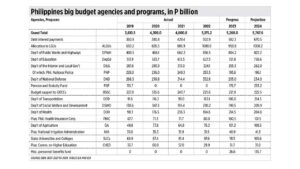Financing growth: Reducing interest payments and spending control

(Part 5 of a series)
Browsing again through the various tables of the Budget of Expenditures and Sources of Financing (BESF), a key document submitted by the Department of Budget and Management (DBM) to Congress yearly, I was surprised to see that of the P5.68-trillion proposed budget for 2024, P670 billion of it is for interest payments of our public debt alone, with principal amortization not included yet. This year the interest payments come to P582 billion.
This is a huge annual transfer of resources from taxpayers — including taxi drivers and tractor operators — to rich institutional lenders. We have huge annual interest payments because we have huge annual borrowings to cover the huge annual budget deficit due to high expenditures while revenues are not catching up with needs.
The lockdown dictatorship of 2020-2021 was a fiscal monster. Many tax-paying businesses were closed down while the government kept spending for its own personnel — national down to barangay. Their salaries, allowances, and bonuses were given intact, plus there were various subsidies that were also given to the public. The annual borrowing of about P0.8 trillion in 2019 became P2.2 trillion a year from 2020 to 2022. The huge loans of 2020 were immediately felt in the jump in interest payments in 2021 and this has gained momentum since.
BIG BUDGET AGENCIES AND PROGRAMSThe table shows the big agencies and programs, all candidates for some spending cuts.
Here are my proposed budget cuts (in case there are legislators who will bother to listen).
One, the state universities and colleges (SUCs): The government’s big expenditures and subsidies for basic elementary and secondary education is understandable, but its extra big spending for tertiary education is not. The really poor students do not reach college, they start working after high school graduation. Many students in SUCs are car owners and have the means to pay for their school fees. The budget for SUCs and the Commission for Higher Education (CHED) is P143 billion this year and P146 billion next year. A potential cut of 20% — or about P30 billion — will help.
Two, the Department of Health and PhilHealth: They will receive a combined P315 billion this year and P306 billion next year, while other agencies have their own annual health services spending too (the Armed Forces of the Philippines hospital, the Philippine National Police hospital, University of the Philippines-Philippine General Hospital, etc.). Plus, there are LGU hospitals — the City of Manila alone has six city-funded hospitals. A potential cut of 10%, or another P30 billion, will help.
Three, some infrastructure projects of the Department of Public Works and Highways and Department of Transportation can instead be assigned for Public-Private Partnership (PPP) funding, plus Maharlika Investment Fund funding. Long-term obligations and contracts between government and private proponents should be respected and not changed midway to attract more investor confidence.
Four, military and uniformed personnel (MUP) pension: Currently this is about P164 billion a year when it should be zero. Other government employees — doctors and nurses, educators and teachers, engineers and agriculturists, etc. — pay for their own future pension via deductions from their monthly salaries, but MUPs pay zero. And these particular pensioners have their pensions indexed to the pay of current active personnel of the same rank which is rising yearly. And the pension is tax-free, extendable to the spouse when the pensioner has passed away. An average tax of 25% on the P164 billion pension, or P41 billion, will help. Plus, monthly contributions by active MUPs.
Five, the rightsizing of agencies, and the abolition or shrinking of those with duplicating functions and passe mandates. Since LGUs now have more money because of the Mandanas ruling, they can assume more social responsibilities like education and healthcare and, thus, national spending on education and healthcare can step back.
IMF REVIEW MISSION ON FISCAL REFORMSThe International Monetary Fund (IMF) has visited the country and conducted the “2023 Article IV Mission to the Philippines.” Among their observations is “Fiscal consolidation is on track, as envisaged under the Medium-Term Fiscal Framework.”
It noted budgeting reforms by the DBM under Secretary Amenah Pangandaman. The IMF said, “Reforms focusing on enhancing public financial management (PFM) has gained momentum. Key legislative initiatives include the Progressive Budgeting for Better and Modernized Governance bill, and National Government Rightsizing bill. The digital transformation of the PFM…”
I am no fan of the IMF but I agree with them on this assessment. The current DBM leadership is serious when it comes to those budget modernization and rightsizing reforms.
Every single year, the Finance department and the DBM scratch their heads over how to allocate very limited resources because all agencies, from national to local, always say they need more money. Any new revenues are always met by new spending concocted by agencies and their lobbying consultants. Assuming P500 billion in new revenues can be generated next year, one can be 100% sure that there will be moves from various agencies to invent new programs or expand existing ones.
The goal of drastically reducing the budget deficit/GDP ratio from the current 5-6% to 3% by 2028, and reducing the public debt/GDP ratio to 40% or less by 2028, can be attained more via 1.) spending control, 2.) lifting or suspending the VAT-exempt privileges of many sectors, and, 3.) developing simpler, profit-based taxation like the mining tax reforms.
A level playing field, both in business regulations and tax imposition, means that all players in each sector should be levied the same taxes and fees. In the energy sector, for instance, both conventional or fossil fuel power plants and renewable plants should pay VAT, import tax, income tax, and so on.
Bienvenido S. Oplas, Jr. is the president of Bienvenido S. Oplas, Jr. Research Consultancy Services, and Minimal Government Thinkers




